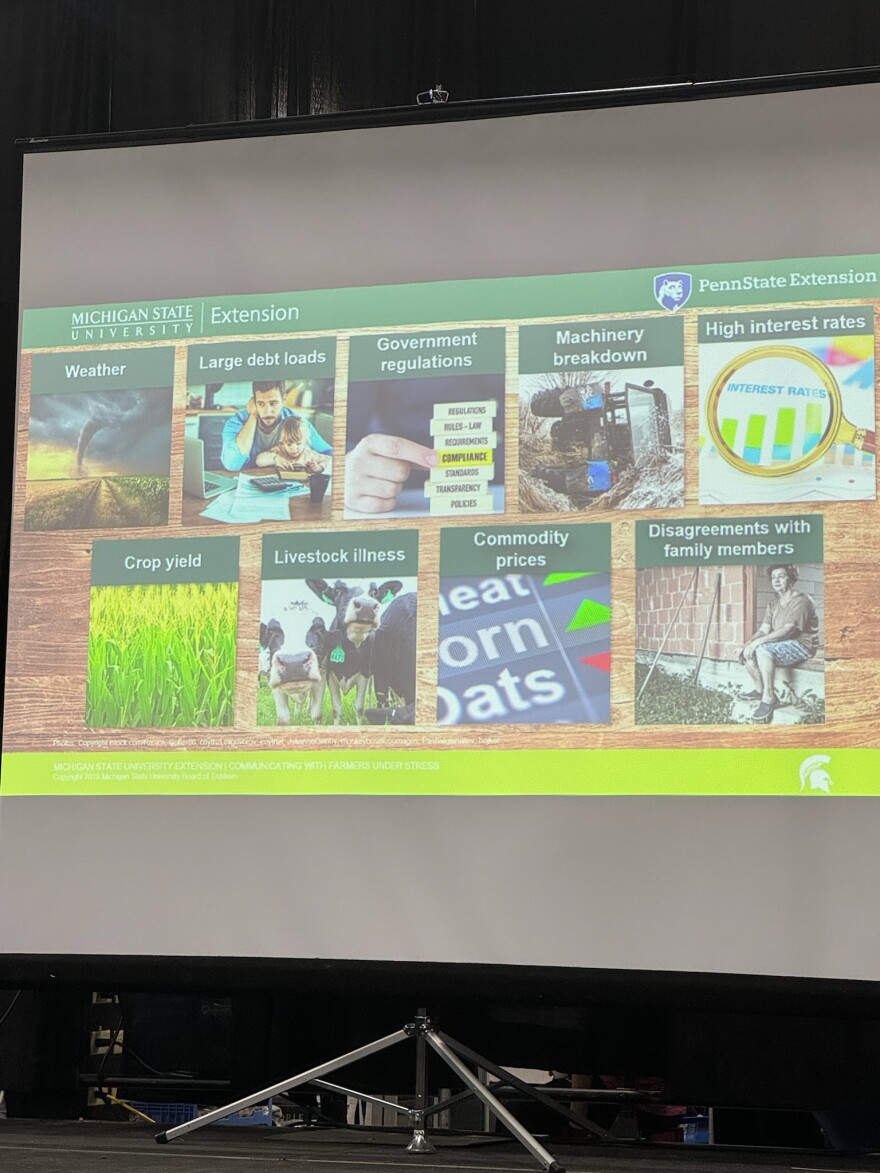Hallstead farmer Benjamin Hepler made his trip to the Pennsylvania Farm Show about more than just food and fun.
The Susquehanna County resident wanted to bring something educational back home to his family’s cattle farm after a day spent eating and wandering around the various exhibits.
He lost a friend to suicide, so Penn State Extension’s “Suicide Prevention in Agricultural Communities” caught his eye.
“I figured this would round out the whole [day],” Hepler said. “Not just skipping work and actually doing something relevant in my line of work.”
A 2018 study done by the Center for Rural Pennsylvania found that the suicide rate in Pennsylvania’s rural counties was 25% higher than the state’s urban counties.
“There's lots of factors that come into that,” said Chi Catalone, an educator at Penn State Extension and a licensed social worker. “Less mental health workers, less access to physical health care, also that stigma and culture in the rural communities. A lot of those things all combined together to play an impact.”
Catalone, who gave the presentation at the 109th farm show in Harrisburg, connected the high suicide rate in rural counties to the statistic that farmers are 3.5 times more likely to die by suicide than those in other occupations.

Agricultural professionals are especially at risk for mental health struggles because of what Catalone called “uncontrollable factors” that impact their livelihoods.
For example, as extreme weather becomes the norm, farmers are forced to deal with its impact on their crop production.
“You have no control over the weather. This last year, we've had some major weather events in Pennsylvania,” Catalone said. “We had a lot of flooding in various areas. Tioga County, I know, was hit very hard [and] other counties in the east, but then out on the western side of the state, we were here suffering from droughts. That's creating great levels of stress.”
The Census of Agriculture found that 85.7% of Pennsylvania farms were family owned and operated as of 2022. Complicated family dynamics often contribute to farmers’ stress.
“Our family farms, they're made up of all family members working together,” Catalone said. “That can be very stressful, trying to work together with your family members, day in and day out, couple that then with if people have different visions for the future of the farm and where it's moving, and having those really hard discussions about succession planning.”
Catalone’s full list of “uncontrollable” factors that contribute to farmers’ stress:
- Weather
- Large debt loads
- Government regulations
- Machinery breakdown
- High interest rates
- Crop yield
- Livestock illness
- Commodity prices
- Disagreement with family members

Hepler agreed with this list. Cattle farming gives him firsthand experience with the mental challenges of working in agriculture.
“If you're a perfectionist, or if you try to be, and then you still get animals that get sick or die or sometimes you take that more personally than you should, and so it can be hard,” he said.
Catalone, who comes from a farming family herself, knows how close farming communities are. In her career as a social worker, she’s seen how difficult it is for rural communities to recover from a loss by suicide.
“A loss of life to suicide in our rural communities really hits," she said. “So that circle of impact is greater because so many people are connected.”
According to Catalone, a difficulty in agricultural mental health is reaching those who need help because of the culture of silent suffering.
“Sometimes people feel a sense of inadequacy, or they feel a sense of pride that they need to be able to manage any problems in life on their own,” Catalone said. “They feel like it's perhaps a sign of their own weakness that they feel depression when they're being affected by factors beyond their own control, whether that's a drought, whether that's a drop in crop prices. Stigma is probably the most difficult challenge when it comes to reaching farmers and ranchers.”
Catalone said early intervention is critical in getting help to anyone struggling with mental health issues.
“The earlier we connect people to help in services, the more likely we're going to have a positive outcome,” she said.
She gave a list of signs that someone could be struggling mentally or thinking about suicide. Catalone pointed out that some of the signs can apply to people who aren’t farmers as well.
Here are the signs:
- Suddenly purchasing guns or stockpiling pills
- Behavior changes
- Putting financial affairs in order
- Giving away prized possessions
- Farm being run down, not at level it normally is
- Missing Farm Bureau meetings

Catalone said the National Suicide Prevention Lifeline — 988 — is a great resource. She encouraged people to use it as a suggestion if they notice any of the warning signs listed above in a loved one.
“If you can just connect them and say, ‘Would you like to call 988 together, we can call on speakerphone, or I can sit here beside you while you talk to them.’ It's a wonderful resource that's here to help,” she said.
The Agristress Helpline is a crisis hotline created specifically for farmers. It’s been available in Pennsylvania since 2022. People in need can call 833-897-2474 at any time and connect with a mental health professional trained to address the unique stressors facing agricultural professionals.
Hepler walked away from the presentation with new information that he plans to apply to his life on the farm.
“I have neighbors that are also farmers, and so it's nice to be able to see those signs and know where to point them,” he said.
He’s glad to know about these resources, especially the Agristress Helpline.
“I hope I don't have to [use it], but if I do need to, I'm glad I sat in on [the presentation],” he said.
For those who want to learn more about the signs and next steps, Catalone recommended Question, Persuade, Refer (QPR) suicide prevention training and Mental Health First Aid training. Penn State Extension offers QPR training monthly for free.
If you or someone you know is struggling with mental health or thoughts of suicide, here are resources to help:
- Agristress Helpline: Call or text 833-897-2474, available 24/7
- National Suicide Prevention Lifeline: Dial 988 or 800–273-8255 or text GO to 74174; Spanish Hotline: 1-888-628-9454; 1-800-Suicide (1-800-784-2433)
- Rural Response Hotline: Call 800-4640-0258 M-F, 8 a.m.- 5 p.m.
- Substance Abuse and Mental Health Services Administration (SAMHSA): Call 800-662-4357
- VETS4WARRIORS: 1-855-838-8255






